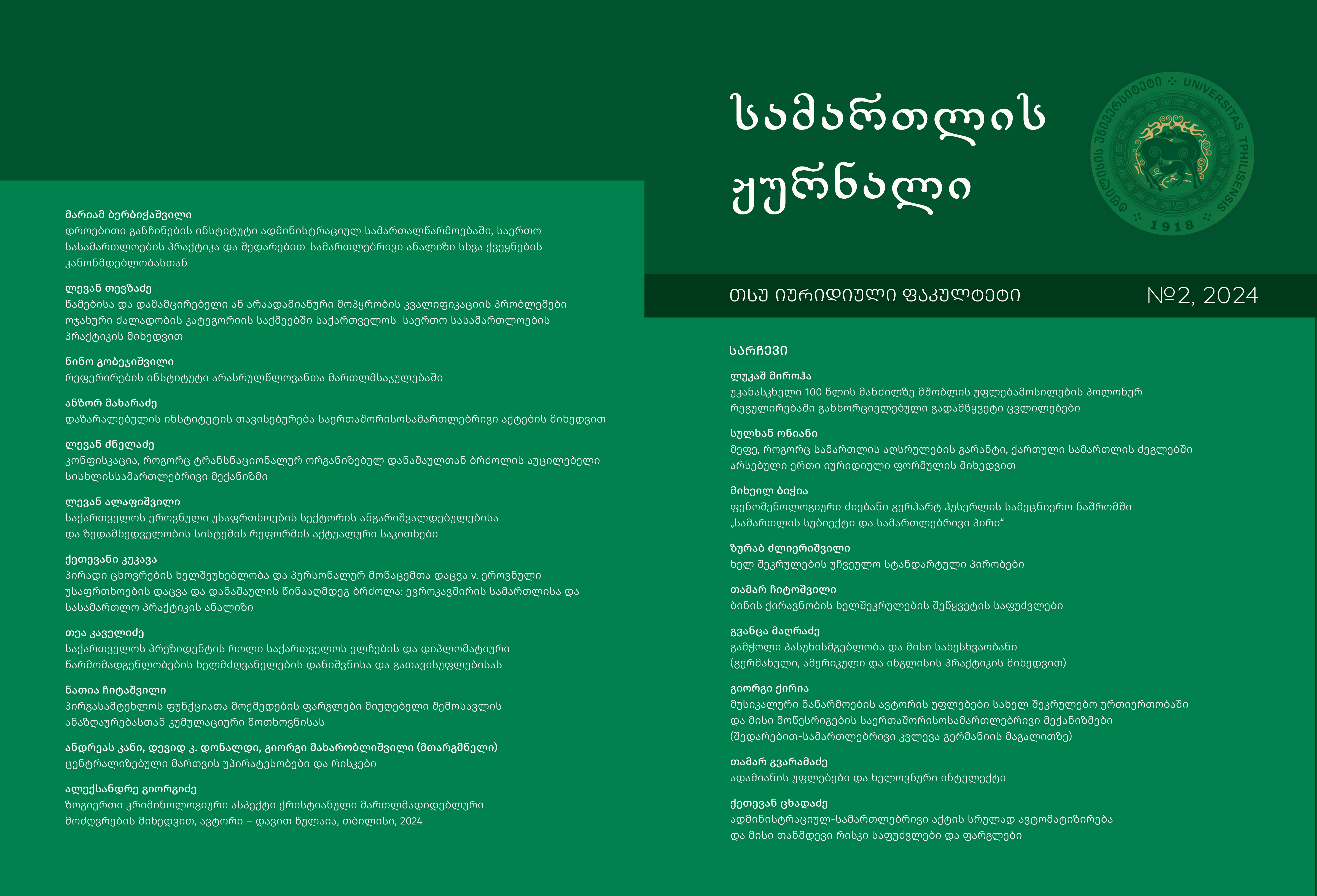Phenomenological Inquiries into Gerhart Husserl’s Scientific Work "The Subject of Law and the Legal Person"
DOI:
https://doi.org/10.60131/jlaw.2.2024.8316Keywords:
Subjectivity of Law, Real Space, Legal Status of Person, Fiction, Authority, Legal System, Individual, Legal Possibility (posse-posse).Abstract
The scientific work presented by Gerhart Husserl is devoted to the concepts of the ontological nature of the subject of law and a legal person. The author analyzes their specific features using a phenomenological approach and offers original findings.
According to the study, the subject of law is regarded as part of the real sphere, while a legal person is seen as an abstract (legal) phenomenon. Gerhart Husserl believes that the subjectivity of law is determined by factors of self-consciousness and personal identity; the subject of law has an individual will, full autonomy, and moral responsibility. As for a legal person, it is considered an artificial construction; its will is determined by collective decisions, and its freedom of action is limited by certain rules. In addition, the responsibility of a legal person is solely legal in nature. The intentionality acting on the subjectivity of law is aimed at one's own consciousness, while a legal person has a functional load. Thus, according to Gerhart Husserl, the distinction between the concepts of the subject of law and a legal person is expressed in their ontological nature, the foundations of origin, specificity of will, scope of autonomy, nature of responsibility, various skills and circumstances.
References
Adriano E. A. Q., The Natural Person, Legal Entity or Juridical Person and Juridical Personality, Penn State Journal of Law & International Affairs, Vol. 4, Iss. 1, 2015, 370, 372.
Beriashvili M., Odishelidze G., The Idea of Freedom in Its Historical Development, in: Classics of the Philosophy of Freedom, from Plato to Heidegger, editors: Beriashvili M., Jeck U.R., Moisisch B., Tbilisi, 2011, 11-12 (in Georgian).
Bichia M., Protection of Private Life According to Georgian Civil Law, Tbilisi, 2012, 121, 327 (in Georgian).
Bichia M., The Content of the Right in the Civil Law, TSU "Law Journal", №2, 2023, 46 (Georgian).
Bichia M., Methodological Problems of Civil Law, Tbilisi, 2023, 149, 151-152, 157 (in Georgian).
Bichia M., The Idea of Protecting privacy from Its Origin to the Present, Revaz Gogshelidze's 65th Anniversary Collection, ed. Khrustali V., Meparishvili G., Tbilisi, 2022, 454-455 (in Georgian).
Bichia M., Legal Obligational relations, Handbook, 3rd edition, Tbilisi, 2020, 19 (in Georgian).
Bichia M., Scope of Civil Legal Concept of Dignity, TSU “Journal of Law”, №2, 2014, 11.
Bichia M., The Danger of the Privacy “Disappearance” during a pandemic in the context of Globalization and the Grounds for its Legitimacy: an institutional analysis, Journal “Globalization and Business”, №11, 2021, 44.
Brox H., Walker W.-D., Allgemeiner Teil des BGB, 30. Aufl, München, 2006, 318-319.
Chanturia L., Introduction to the General Part of Georgian Civil Law, Tbilisi, 2000, 57-58 (in Georgian).
Crespo M., Husserl on Personal Aspects of Moral Normativity, Ethical Perspectives, 22, No. 4, 2015, 704, 707.
Demirsoy N., Kirimlioglu N., Protection of privacy and confidentiality as a patient right: physicians’ and nurses’ viewpoints, Biomedical Research- India, Vol. 27, Issue 4, 2016, 1437-1438.
Hübner H., Allgemeiner Teil des Bürgerlichen Gesetzbuches, 2. Auflage, 1996, 77.
Husserl G., Rechtssubjekt und Rechtsperson, Archiv für die civilistische Praxis, 127. Bd., H. 2, 1927, 130-131, 133-134, 138-139, 142-143, 147, 152-154, 157, 159, 168-170, 176, 178-179, 180-181, 183, 186-187, 191, 193-194, 199, 208-209.
Husserl E., Paris Lectures // Husserl E. Selected Works, Moscow, 2005, 349 (in Russian).
Husserl E., Articles on Renewal, Questions of Philosophy, No. 4, 1997, 120 (in Russian).
Khetsuriani J., Functions of Civil Law, Tbilisi, 1995, 92 (in Georgian).
Kochashvili K., Civil Liability for the Actions of Persons Without Legally Valid Will, "Legal Methods", №7, 2023, 96-99 (in Georgian).
Khubua G., Theory of Law, Tbilisi, 2004, 208 (in Georgian).
Martini S., Die Formulierung der Menschenwürde bei Immanuel Kant in: Vortragsskript eines im WiSe 2005/06 gehaltenen Referats im Rahmen des rechtsphilosophischen Seminars “Die aktuelle Werte-Debatte” bei Prof. Klaus Adomeit (Freie Universität Berlin), 2005/06, 5-7.
Maunez E. G., Introduction to Law, 31st ed., 1980, 21.
Moran D., Introduction to Phenomenology, Routledge, 2000, 4-5, 16.
Pantykina M. I., Phenomenological Methodology: Experience in Legal Research, Yekaterinburg, 2008, 242 (in Russian).
Rössler B., Der Wert des Privaten, Frankfurt am Main, 2001, 274.
Stovba O. V., Temporal Ontology of Law, Dissertation Abstract, Kharkov, 2017, 15 (in Russian).
Varga A. P., Brentano’s Influence on Husserl’s early notion of Intentionality, Studia Universitatis Babes-Bolyai, Philosophia, 54, no. 1-2, 2008, 44-45.
Wolf E., Recht und Welt. Bemerkungen zu der gleichnamigen Schrift von Gerhart Husserl (Sonderdruck aus der Festschrift fur Edmund Husserl), Zeitschrift für die gesamte Staatswissenschaft/ Journal of Institutional and Theoretical Economics, Bd. 90, H. 2, 1931, 332-333, 345.
Zahavi D., Husserl's Phenomenology, translator: Gonashvili G., Tbilisi, 2016, 166 (in Georgian).
Zahavi D., Phenomenology, Basics, 1st Edition, Routledge, 2018, 1-2.
https://www.geni.com/people/Gerhart-Husserl/6000000011571359886 [02.011.2023].
Downloads
Published
How to Cite
Issue
Section
License

This work is licensed under a Creative Commons Attribution-ShareAlike 4.0 International License.









